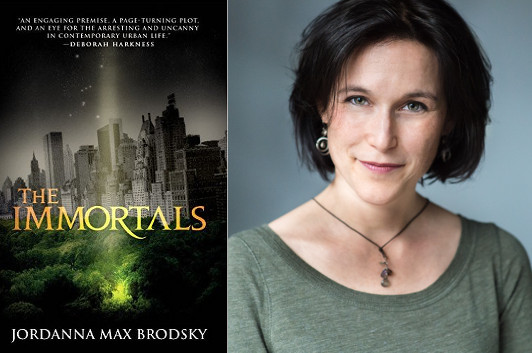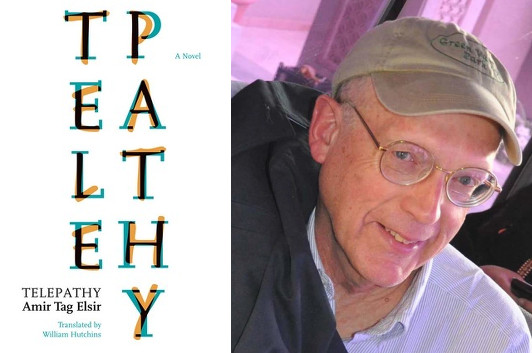Jordanna Max Brodsky: The Heroine We Deserve, the Sidekick She Needs

photo: Ben Arons
I’m actually a bit jealous of the folks at Orbit who got to publish The Immortals, the debut novel by Jordanna Max Brodsky. I was lucky enough to read this story, which places the classical Greek pantheon into the modern suspense thriller, when it was making the rounds, and I was immediately impressed by the strength of Brodsky’s voice—it’s not just that the premise is cool, but that she fleshes it out with great characterizations, too. In this guest essay, she pulls back the curtain and explains some of the work that went into making her divine and human characters equally compelling. What she reveals makes perfect sense in retrospect, but she’s done it so well that it wouldn’t occur to you—or at least it didn’t to me—to think about the mechanics involved while you’re engrossed in the story.
I consider myself an unrepentant nerd. Academic over-achiever, Star Wars aficionado, player of board games, avoider of all things athletic. The heroine of The Immortals, on the other hand, is Selene DiSilva, a bow-wielding, ass-kicking, hard-as-nails vigilante who also just happens to be the Greek goddess Artemis living in modern day Manhattan. So my nerdophilic proclivities wound up centered squarely on the male protagonist of the book instead: Theodore Schultz, classics professor. Selene is stronger than he is, far more violent, and less emotionally vulnerable. In my mind, they make a perfect opposites-attract couple.
Most of my female friends agreed with my perspective when I asked them to read a draft. Theo is just the kind of guy they want around—a talker, a listener, and all around brilliant thinker. Then I let some male friends give me feedback and… boom! My blithe reversal of gender stereotypes ran smack dab into a brick wall of testosterone.
“Why is Theo a wimp?” they demanded. (He’s not a wimp, I’d reply, he’s just not into violence.) “Why is he such a nerd?” they asked. (He’s a classicist! Did you expect him to be the cool kid in school?)
Cue the throwing up of hands, the rolling of eyes, the “Why don’t you just make him a detective? Make him cool and calm and tough.” Then my equally frustrated reply: “Because Selene is all those things! She used to be a cop! She’s the Huntress, for goodness sake. She certainly doesn’t need a man to teach her how to track a killer or use a bow.”
18 April 2016 | guest authors |
William Hutchins and Amir Tag Elsir

photo: Nimah Ismail Nawwab
A famous Sudanese writer meets an annoyingly odd man at the signing for his latest novel; later, having been dragged to a lecture he doesn’t particularly care to attend, that writer sneaks out for a smoke break, only to encounter the same man—and to discover that he has the same, rather uncommon, name as a character in his book. That’s the set-up for Telepathy, the new novel from the Sudanese novelist Amir Tag Elsir, which has been translated for English-language readers by William Hutchins, who’s perhaps best known to American audiences for his translation of Nobel laureate Naguib Mahfouz’s Cairo Trilogy. And if you think you know where that set-up might be headed, you might want to think again… although, since it’s a rather short novel, it won’t take you very long to find out for yourself!
The contemporary Sudanese author Amir Tag Elsir has a gift for writing genuinely amusing and humane novels about topics like Ebola and ethnic tension in Sudan. Not gallows humor, his novels are full of antic, frolicsome wit. With carefully observed and meticulously described observations of life in Port Sudan or Khartoum, he builds hard-to-refute cases for our generic silliness, which we should embrace to achieve our full potential as human beings.
When one of Tag Elsir’s novels was short-listed for the International Prize for Arabic fiction for 2011, Samuel Shimon of Banipal, a magazine of modern Arab literature, asked me to translate an excerpt from it. That opportunity inspired me to translate the entire novel, which was published in 2012 as The Grub Hunter by Pearson Education Limited for a temporarily revived Heinemann African Writers Series, which had once published books by Tag Elsir’s late uncle, Tayeb Salih, a much admired Sudanese author. In The Grub Hunter, a police officer who once jailed subversive writers decides to write a novel himself after losing his job and a leg in a stakeout.
I also translated Amir Tag Elsir’s French Perfume for the ANTIBOOKCLUB of New York, and in March 2016 it was named to the Best Translated Book Award Fiction Longlist. French Perfume tells the story of a marginal slum’s self-appointed herald who reinvents himself when he learns a Frenchwoman may come to reside in his community as part of some international project. He falls madly in love with her internet profile, which is relayed to him by a local teenager, who has learned how to surf the web.
Sufism, Islamic mysticism, has provided literary inspiration for many Arab authors who themselves may not have been Sufi practitioners. Sudan has a rich Sufi heritage that is evident both in the name Tag Elsir and in the novel French Perfume, which can be read as an updated version of the romance between an ancient Arab poet, Majnun, who lost his mind but gained gnosis through his thwarted love for beautiful Layla. Ali Jarjar, the transformed busybody, re-enacts Majnun’s tragedy as he waits and waits for the Frenchwoman to arrive.
17 April 2016 | in translation |

 Our Endless and Proper Work is my new book with Belt Publishing about starting (and sticking to) a productive writing practice.
Our Endless and Proper Work is my new book with Belt Publishing about starting (and sticking to) a productive writing practice. 
